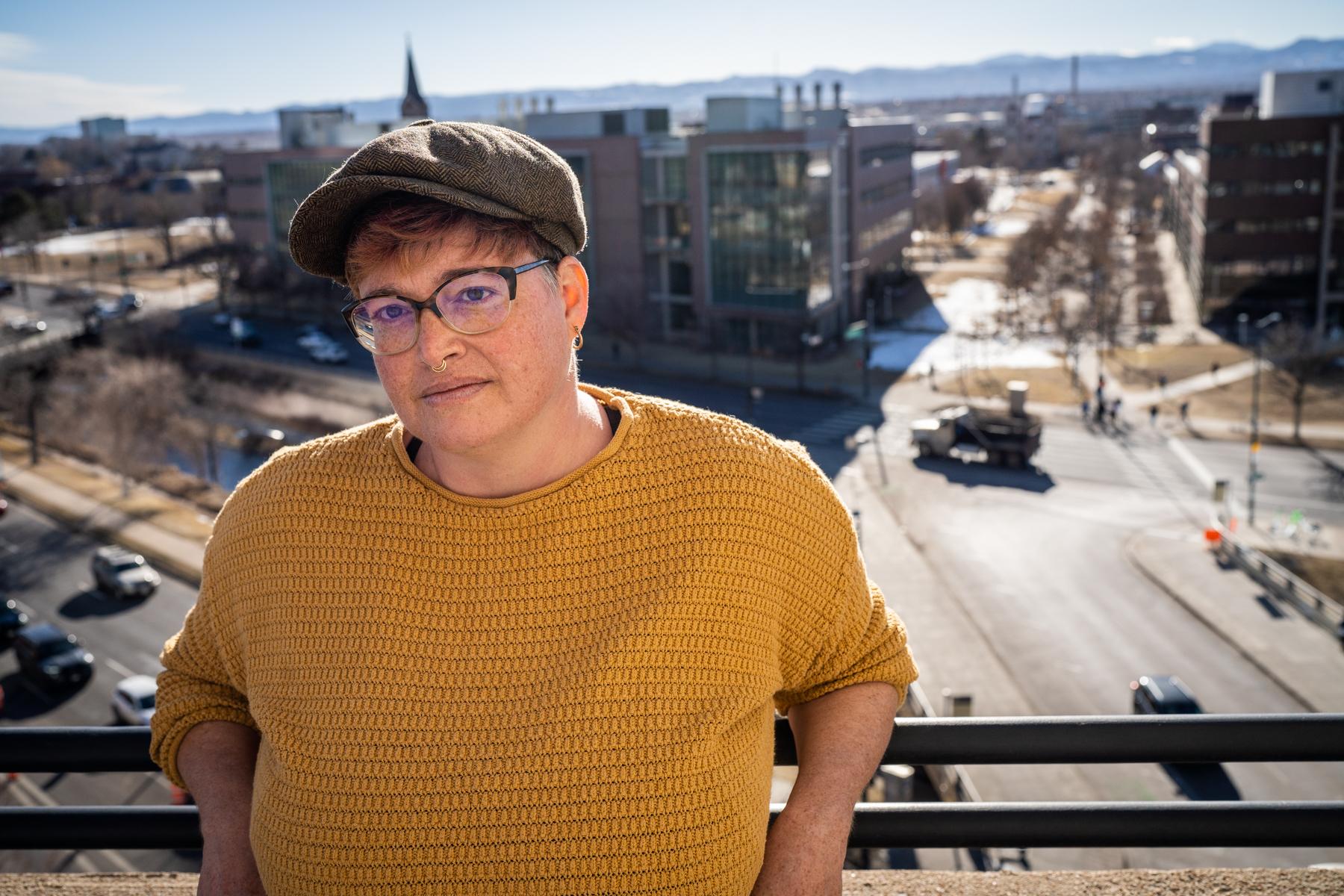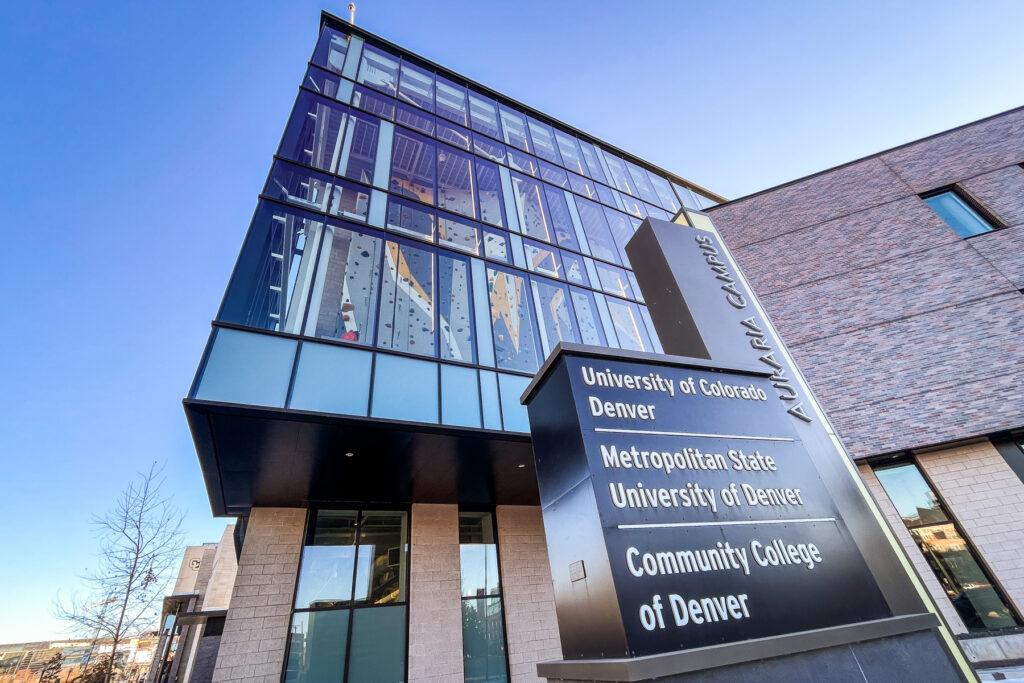
Editor's note: This article was updated at 8:35 a.m. Friday to include further perspective from faculty representatives and the announcement of Provost Alfred Tatum's departure.
Jessica Bertram is taking some much-needed time off.
Ever since the pandemic started, the college math instructor’s life has been tumultuous. Her brother died, she went through severe bouts of depression and anxiety, and the general state of the world left her feeling drained. And on top of that all, teaching just got harder, even after in-person classes resumed.
“It was exhausting for me to try to get what I needed done for the students and still feel I was doing the rest of my job justice,” said Bertram, a non-tenure track teacher at Metropolitan State University of Denver. “By the time this last fall was about halfway done, I knew I needed to do something.”
Bertram is taking the spring semester off to recover from burnout and plans to return to MSU Denver in the fall.
Normally, Bertram teaches five classes a semester. But the coming fall was supposed to be different. Administrators at MSU Denver promised a reduction in workload for all faculty members, something Bertram said she was looking forward to.
“I would've been down to 12 hours [of classes] a semester and three hours of service,” Bertram said. “So it was good for me. It was good for many people.”
But, in a memo from MSU Denver president Janine Davidson sent Jan. 31, faculty were informed the reduced workload was being put on hold, as the Board of Trustees opted to delay voting on the policy over questions on its financial sustainability. The news has roiled a campus where many believed the policy was imminent.
“It caught, I think, everyone off guard,” said Sheila Rucki, a political science professor at MSU Denver. “Everyone was surprised. The deans, everyone who had been sort of planning for the implementation in fall, was just shocked.”
A reduced workload has been years in the making
There have been rumblings about the need to reduce the teaching workload for decades, but the initiative really started gaining momentum in 2021, when Alfred Tatum joined MSU Denver as its provost. Tatum tasked a group to provide a report on the optics of cutting down on faculty obligations.
Tatum eventually voiced his support for a reduced workload proposal from the university’s Faculty Senate in March 2022. He wrote in a memo to faculty that his office would begin implementing the plan in fall 2023.
But on Friday, Tatum announced he would step down from his role as Provost and return to research and teaching, according to a statement from MSU Denver.
Under the proposed plan, tenure-track and non-tenure-track faculty would see their workloads ease. Under current requirements, most tenure track professors teach four classes a semester, on top of research responsibilities and student support, like office hours and overseeing clubs. The planned reduction would have brought most faculty members down to three classes a semester.
With faculty taking on fewer classes in the plan, the proposal included increased expenditures to hire professors. Deans within the university provided estimates for what each department would require.
“Initial projections indicated the need for 78 faculty at an approximate cost of $7.4 [million],” Tatum wrote in a memo. “The actual cost will be lower. The current base budget assigned to the Provost’s Office will cover the first phase of the implementation from faculty savings that are approximately $3 [million].”
Deans and department chairs began to make preparations for the reduced workload, on the assumption the plan was on track for the fall of 2023.
“We started scheduling classes in the fall, which is no easy feat, to accommodate the three class load,” Andrea Maestrejuan, a history professor, said. “It's just stunning that we could get this far with all of the senior leadership on campus, acknowledging that this was going forward, and then have it paused because it wasn't clear that the Board of Trustees felt comfortable enough with the budget to approve it.”
Trustee: ‘We realized that there's still a lot of unanswered questions’
On Jan. 26, Tatum presented a formalized proposal to the Trustees’ Committee of Academic and Student Affairs, stating his full endorsement and support for the plan. His presentation ended by recommending that the board approve the first year of the reduced workload, with subsequent years contingent upon further financial analyses.
The presentation was scheduled for 15 minutes. The discussion that followed went on for almost two hours. Trustees questioned what would happen if they approved the first year, but were unable to afford the reduced workload following that year.
“Why not model this out right now with key assumptions clearly articulated, so that there is a multi-year view of what this looks like that can be decided upon at the same time,” said Russell Noles, chair of the board. “Make a commitment that we’re going to do this, because this is really a long-term thing.”
The board was also concerned about what is likely to be a significant investment in more professors to take on the surplus of classes.
Eventually, trustees came to the agreement that they’d take no immediate action on the proposal.
“It's a major commitment, and I'm looking forward to having more conversations about it,” board vice-chair Kristin Hultquist said.
Provost Tatum pressed for more clarity asking, “How many more? How many more conversations?”
The board will next discuss the proposal in the fall retreat this coming October, past the anticipated implementation date.
Marissa Molina, the chair of the Academic and Student Affairs Committee, said the January meeting was the first time they saw a full outline of the reduced workload proposal.
“We had not been given the insight of what this proposal would look like in rollout,” Molina told CPR News. “So, after we heard this proposal on the 26th, we realized that there's still a lot of unanswered questions.”
Molina said, ultimately, the trustees are in a tough position due to the state’s low funding of higher education and a decreased student population at MSU Denver. While state funding did increase last year, higher education leaders said it wasn’t enough to prevent more tuition increases. Compared to other similarly sized colleges in different states, tuition and fee revenue in Colorado generally higher than normal.
“We are still not at a place where we are being funded in the same ways that other institutions are,” Molina said. “Nor do we have the kind of money to be able to implement, at a minimum, an information technology system that allows us to have the modeling to make this decision today.”

While trustees and administrators discuss, faculty weigh further action
A meeting between the chairs of each academic department revealed a deep unhappiness following the decision to delay the workload proposal’s implementation until 2024 at the earliest.
“It's a blow to morale. It says to us that the president doesn't care about faculty. The board of trustees don't care about faculty,” one committee meeting attendee said.
“I think this has been a colossal waste of resources for which senior management is responsible and needs to be held accountable,” another said.
Davidson defended the board’s decision to delay the implementation, agreeing they need to take the time to analyze the financial impact of the plan.
“Unfortunately, there may have been some misunderstanding on the timeline, approval and implementation process, and we regret any disappointment or surprise this may have caused,” Davidson said in a statement “We hear the faculty’s concerns, and the university will be moving ahead with an inclusive process to gather data and input on the faculty workload proposal that will help us further assess our approach going forward.”
Davidson was unavailable for further comment. MSU Denver did not respond to multiple requests for comment from Provost Tatum.
Four peer-elected faculty leaders, including Rucki and faculty trustee Meredith Jeffers, reaffirmed the faculty support of a reduced workload and committed to finding a path forward with senior leaders in a joint letter. They said their response “best captures faculty perspectives across campus” due to their collective roles.
“Our hope is that the work we do together now will result in outcomes that, looking back, demonstrate that this pause resulted in progress and ongoing positive change for MSU Denver, our faculty, and, most importantly, our students,” the joint statement said.
The group said their main goals will be to foster transparency as the process continues, assist with the financial analysis of the proposal, and continue advocating for its implementation.
Since the January trustee meeting, several groups of faculty members have bombarded the university’s upper administration with demands for answers and a reaffirmation of support for the workload reduction. Craig Svonkin, an English professor, said the debate has united the faculty.
“The one silver lining is, across the political spectrum that you get when you have a lot of faculty, there's almost universal anger about this,” Svonkin said. “Maybe we needed to be betrayed.”
However faculty ultimately have no power to affect the change it wants to see. All most instructors can do is write stern letters and complain at faculty meetings. However, some professors brought up the possibility of a vote of no confidence — a formal resolution taken at the university’s Faculty Senate, which represents the needs of the faculty in front of the Board of Trustees.
Political science professor Rucki said she’s heard talks of a vote, but believes it is too soon to rush to that decision.
“I don't have a real sense of having a lot of momentum right now, but it certainly could get momentum,” Rucki said.
Maestrejuan, the history professor, agreed, adding that a vote of no confidence, whether directed at the president or the provost, wouldn’t solve the problem.
“I'm not sure targeting individuals at this point is going to be useful or constructive, because it's very easy to blame one or two individuals for this situation,” she said. “But it's systemic. It's endemic into the institutional infrastructure of this university, and I'm hoping that is what's going to change.”









